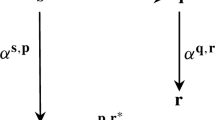Abstract
This paper considers a special case of belief updating—when an agent learns testimonial data, or in other words, the beliefs of others on some issue. The interest in this case is twofold: (1) the linear averaging method for updating on testimony is somewhat popular in epistemology circles, and it is important to assess its normative acceptability, and (2) this facilitates a more general investigation of what it means/requires for an updating method to have a suitable Bayesian representation (taken here as the normative standard). The paper initially defends linear averaging against Bayesian-compatibility concerns raised by Bradley (Soc Choice Welf 29:609–632, 2007), as well as problems associated with multiple testimony updates. The resolution of these issues, however, requires an extremely nuanced interpretation of the parameters of the linear averaging model—the so-called weights of respect. We go on to propose a role that the parameters of any ‘shortcut’ updating function should play, by way of minimal interpretation of these parameters. The class of updating functions that is consistent with this role, however, excludes linear averaging, at least in its standard form.
Similar content being viewed by others
References
Aumann, R. J. (1976). Agreeing to disagree. The Annals of Statistics, 4(6), 1236–1239.
Bradley, R. (2007). Reaching a consensus. Social Choice and Welfare, 29, 609–632.
Christensen, D. (2007). Epistemology of disagreement: The good news. The Philosophical Review, 116(2), 187–217.
Clemen, R. T., & Winkler, R. L. (1999). Combining probability distributions from experts in risk analysis. Risk Analysis, 19(2), 187–203.
Diaconis, P., & Zabell, S. L. (1982). Updating subjective probability. Journal of the American Statistical Association, 77(380), 822–830.
Elga, A. (2007). Reflection and disagreement. Noûs, 41(3), 478–502.
Feldman, R. (2007). Reasonable religious disagreements. In L. Antony (Ed.), Philosophers without God: Meditations on atheism and the secular life (pp. 194–214). Oxford: Oxford University Press.
Field, H. (1978). A note on Jeffrey conditionalization. Philosophy of Science, 45(3), 361–367.
French, S. (1985). Group consensus probability distributions: A critical survey. In J. M. Bernado, M. H. DeGroot, D. V. Lindley, & A. F. M. Smith (Eds.), Bayesian statistics (Vol. II, pp. 183–197). Amsterdam: North-Holland.
Genest, C., & Zidek, J. V. (1986). Combining probability distributions: A critique and an annotated bibliography. Statistical Science, 1, 114–148.
Jeffrey, R. (1988). Conditioning, kinematics, and exchangeability. In B. Skyrms, & W. Harper (Eds.), Causation, chance, and credence (Vol. 1, pp. 221–255). Dordrecht: Kluwer.
Jehle, D., & Fitelson, B. (2009). What is the “equal weight view”? Episteme, 6(3), 280–293.
Kelly, T. (2005). The epistemic significance of disagreement. In J. Hawthorne, & T. Gendler Szabo (Eds.), Oxford studies in epistemology (Vol. 1, pp. 167–196). Oxford: Oxford University Press.
Lehrer, K., & Wagner, C. (1981). Rational consensus in science and society. Dordrecht: Reidel.
Shogenji, T. (2007). A conundrum in Bayesian epistemology of disagreement. Available online at www.fitelson.org/few/few_07/shogenji.pdf
Wagner, C. (1985). On the formal properties of weighted averaging as a method of aggregation. Synthese, 62, 97–108.
Wagner, C. (2002). Probability kinematics and commutativity. Philosophy of Science, 69, 266–278.
Author information
Authors and Affiliations
Corresponding author
Rights and permissions
About this article
Cite this article
Steele, K. Testimony as Evidence: More Problems for Linear Pooling. J Philos Logic 41, 983–999 (2012). https://doi.org/10.1007/s10992-012-9227-5
Received:
Accepted:
Published:
Issue Date:
DOI: https://doi.org/10.1007/s10992-012-9227-5




